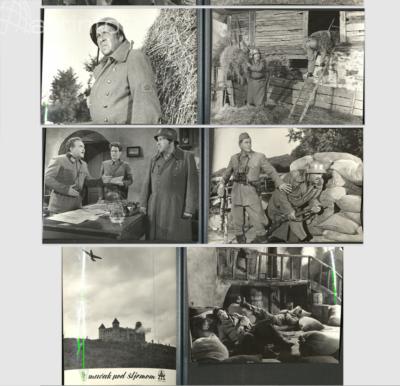Joza Horvat's Tomcat under the Helmet (part 1): On Soldier Humor

The writer Joža Horvat, inspired by his own experiences of partisanship, wrote about the Yugoslav Partisan war in his 1962 comic novel Mačak pod šljemom [Tomcat under the Helmet]. It became an exceedingly popular novel that was adapted into a film during the same year, and then into a television series in 1978.
The plot of the novel is grounded in real World War II events that took place in the north of Croatia. In September 1944, the imaginary 32nd Partisan Division descends from Mt. Kalnik to the county of Zagorje to sow confusion in the enemy ranks around Zagreb. The figure of Ilija Kapara, “corporal of the first squad of the first platoon of the first company of the first battalion of the First Shock Brigade of Kalnik,” stands out.
Kapara is an unwilling hero as well as an inventive and cunning Partisan “tomcat.” He is also the possessor of a prickly sense of humor; in that, he is not unlike his creator, who was inconvenienced by it more than once. Importantly, Kapara is the first literary Partisan soldier whose sense of humor presents his principal weapon in his daily contest with death. His is a familiar type of military humor; it is often considered exaggerated, inappropriate, and rude, and as such had found no place in most published materials about Yugoslav Partisan warfare.
For instance, after his first battle in the Partisan ranks, during which he had shot two enemy soldiers, Kapara feared that he would have nightmares about the men he had killed. Comforting the trembling soldier, the unit commander assured Kapara that he would certainly not dream of them and that he should rather concentrate and shoot at least two more men the following day! In September 1944, as a result, when he overpowers an Ustasha soldier with a knife, Kapara jokes with ease that “they can now blow up the ass of the guy in the hayloft, the air will come out of his back.” The Home Guard soldier, in whose company Kapara is at that time, exclaims in amazement: “Slaughtering a man to you is like letting out a fart to a child!”
The most interesting thing about Tomcat under the Helmet is that, although civilians commonly find it difficult to accept the sharpness of military humor, when the book was adapted and appeared on television, the people who felt most offended were the Partisan veterans. They complained to Zagreb television that the author of the book had tarnished the reputation of the Partisan struggle during World War II. In the section which seems to have upset them the most, Horvat—quite gently—mocked the partisans’ “provenance.” Specifically, he wrote that there were Partisans who got involved in the war completely by chance—for instance, because they wanted to escape their overbearing wives or because they did not want a girl to see their dirty underwear, as was the case with Kapara’s comrade Vodenjak. Recounting the common fate of many a Home Guard soldier—that in Partisan captivity they could choose to return home only in their underwear or to keep their clothes and weapons and become Partisans—he explained to his comrades:
And that’s how it started, some [soldiers in his Home Guard unit] took off their clothes, some stayed, and all this was watched by the Partisans, and not only Partisans, but, as I said, by the whole village, women, old people, children …. Near me was a pretty village girl, as rosy as an apple. That girl made me sweat. The time to decide was getting closer and closer, I’d like to go home, but I know that my underpants are smeared and torn, I’m going to burn with shame! What should I do, what should I do?! That girl is looking at me, I’m looking at her, and all I can think of are my damned Home Guard shorts and I’m sweating. And when it was my turn to stay or to take off my pants, I raised my hand and shouted in despair: – Comrade, I am yours …
To answer the Partisan veterans’ angry letters, Zagreb television arranged a guest appearance by Joža Horvat himself. The author explained to all who felt offended by his novel that he had spent time with and fought with soldiers who were just like those he wrote about. More importantly, he explained that soldiers such as Ilija Kapara and the men in his squad had successfully resisted all difficulties precisely because they were armed with more than just rifles and bombs. Their superpower—just like the author’s—was, of course, humor.

(source: https://artinfo.ba/index.php/zanimljivosti/32209-macak-pod-sljemom-kiseljak-kao-filmska-kulisa-i-prva-crta-bojisnice)
Bibliography
Horvat, Joža. Mačak pod šljemom [Tomcat under the Helmet]. Zagreb: Naprijed, 1989.
Sabljak, Tomislav. “Humor i lirizam Jože Horvata” [“Joža Horvat’s Humor and Lyricism”]. Mogućnosti 10 (1962): 947–952.
“Joža Horvat – književnik i moreplovac” [“Joža Horvat – Author and Seafarer”]. Accessed: June 14, 2023. https://www.youtube.com/watch?v=e6pTA1eyXTw.
